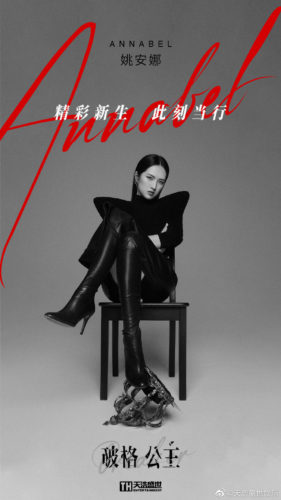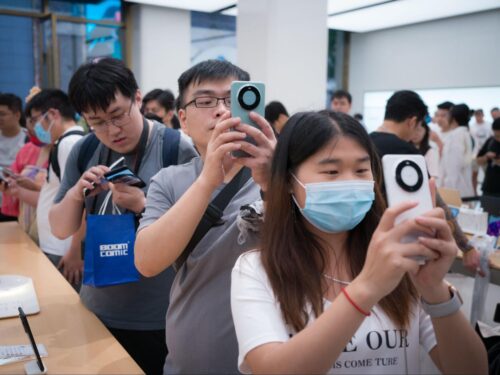Huawei heiress Annabel Yao makes a grandiose foray into showbiz. Haters have a lot to say
Her debut was a fashion shoot for Harper's Bazaar China, a music video, and a 17-minute documentary that features her “artistic journey” as a “rule-breaker princess.”

Annabel Yao (姚安娜 Yáo Ānnà) is the youngest daughter of Huawei founder and CEO Rén Zhèngfēi 任正非, and the half sister of his daughter, the currently detained Huawei executive Mèng Wǎnzhōu 孟晚舟. Yao has stepped into show business in China and signed with a Beijing-based entertainment company to be a model and fashion influencer.
Her debut was a fashion shoot for Harper’s Bazaar China, a music video, and a 17-minute documentary (in Chinese) that features her “artistic journey” as a “rule-breaker princess.” The media blitz has set the Chinese internet abuzz with criticism of her privileged upbringing and doubts about her real talent.
Debutante in thigh-high boots
In a slick poster released on Thursday along with the documentary, Yao, dressed in a sharp-shouldered top and thigh-high leather boots, sits on a simple-looking chair with one foot comfortably resting on a crown on the ground. “Brilliance reborn in real time,” reads a line above her confident, slightly menacing stare.

Yao said on Weibo (in Chinese) that entering the entertainment industry was a “special birthday gift” she had given to herself. She said the documentary, which features her practicing singing and dancing in the days leading up to her high-profile debut, was a statement that she wanted to stay true to herself, which she thought was “the first necessary step to take before going forward.”
China news, weekly.
Sign up for The China Project’s weekly newsletter, our free roundup of the most important China stories.
Like most celebrity documentaries made for self-promotional purposes, Yao’s isn’t particularly revealing or hard-hitting. In between footage of her childhood and her receiving training as a rookie star, the most intimate moment of the short film comes when Yao sits for an interview, in which she is asked what she thinks of all the labels that people attached to her, including “socialite” and “someone born into money.”
“I never saw myself as a princess. Just like most people my age, I needed to put a lot of effort into studying to get into a good school,” Yao says. (She is a Harvard graduate with a degree in computer science.) “I also felt lost after college, but I kept trying different things before I found what I was passionate about.”
At another point, Yao brings up her half sister, Meng Wanzhou, who is 25 years older than her and has been held in Canada for more than two years on Huawei-related criminal charges. “I had often wondered why there were so many negative comments about me on the internet and everyone seemed to prefer Meng over me. I thought it was unfair at first. But later I realized that everyone had their haters and supporters. That’s beyond my control. But what I can do is employ those doubts to propel my career forward,” she says.
Poor little rich girl?
As the only child of the marriage of Ren Zhengfei, one of the richest men in China, and his second wife, Táo Líng 姚凌, the 23-year-old grew up with professional ballet lessons, attended prestigious schools, and has enjoyed her parents’ social and business connections. In 2018, Yao became one of the 20 women from globally prominent families who attended Le Bal des Debutantes in Paris, the most high-profile debutante ball in the world.
Since then, the aspiring socialite has made frequent appearances at fashion events and in the media. That’s when people started comparing her with Meng, accusing her of making no contribution to her family business while leveraging her father’s wealth for personal fame.
The documentary does address this, with a few self-critical moments when Yao shows her awareness of all the unfavorable opinions about her. But it’s also apparent that she downplayed her famous family in the documentary, perhaps in an attempt to come across as a genuine and relatable person trying to make it in the entertainment industry.
Nonetheless, critics were not pleased. Their main gripe about the documentary was its tone, which they argued offered a deceptive narrative that Yao lifted herself up by her bootstraps. If Yao didn’t have Ren as a father, her doubters point out, her success would have been much harder to come by. “She said she had ‘resigned her life to fate’ before discovering a passion for singing. Apparently, she has no idea that her fate is what millions of people want to have,” a Weibo user commented (in Chinese).
“Stop it!! Stop pretending that you have talent and you worked hard to get where you are,” wrote (in Chinese) another skeptic. “You should learn about privilege. Specifically, that you…have it.”
Many took issue with her struggles portrayed in the short film, including Yao shoveling a bowl of salad into her mouth in the back of a cab while trying to handle a hectic schedule. “The fact that she considered that a struggle speaks volumes about how detached she is from reality,” a critic wrote.
Some also pointed out that her “struggles” paled in comparison with what her half sister, Meng, has been through. “Do you know your sister is on bail and under partial house arrest in Canada? Have you considered making an effort to save her?” another critic chimed in (in Chinese). “She went to Harvard and learned computer science. And yet the idea that she should apply her knowledge in developing Huawei seemed to have never crossed her mind,” said (in Chinese) another critic.
Yao did have some supporters, however, such as a Weibo user who offered (in Chinese), “She is entitled to live her life the way she wants. Keep your sour grapes to yourself. Congrats, girl. You earned it.”






